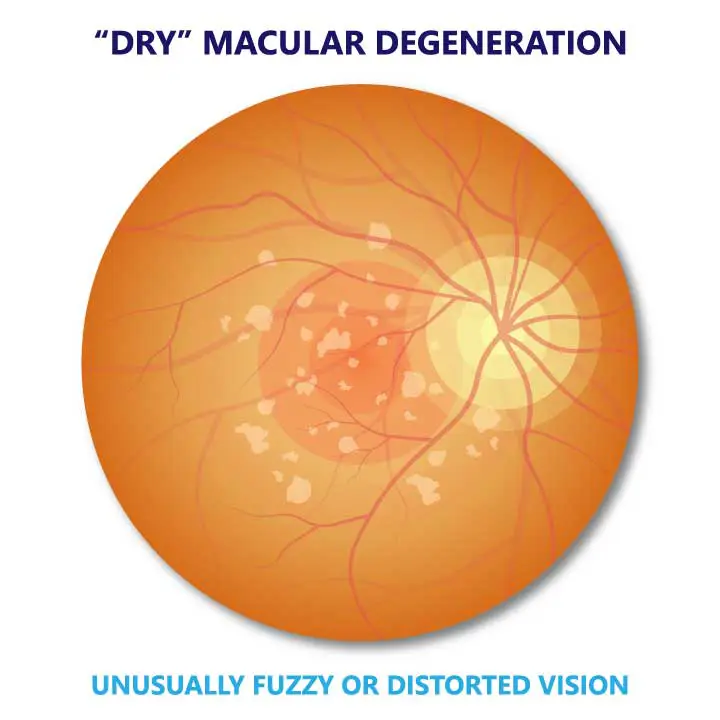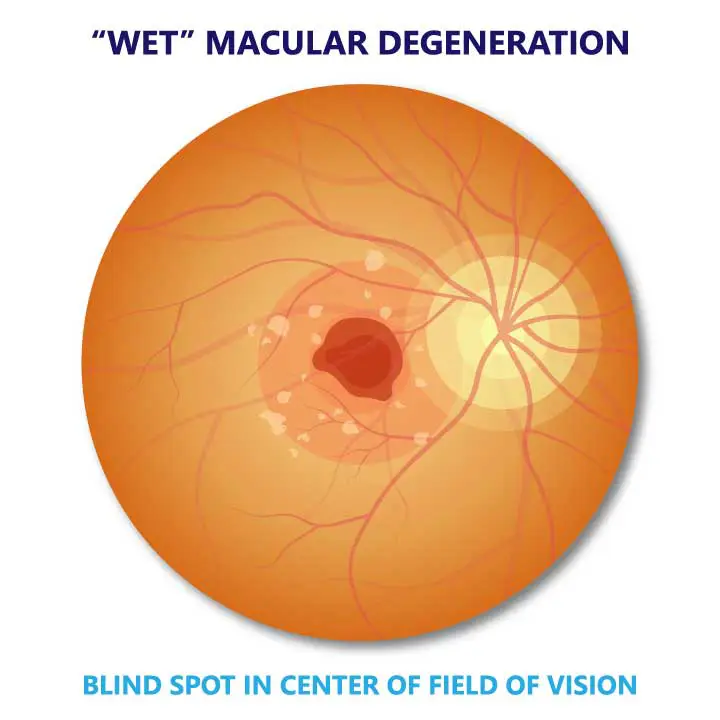What is Macular Degeneration?
13-04-2022
Macular Degeneration Defined
Macular Degeneration (a.k.a., Age-Related Macular Degeneration) is the deterioration of the macula, which is the small central area of the retina of the eye that controls visual acuity, or sharpness of vision. The health of the macula determines a persona's ability to read, recognize faces, drive, watch television, use a computer, and perform any other visual tasks that requires on to see fine detail.Macular Degeneration is the leading cause of vision loss among older North Americans, and due to the aging of the population, the number of people affected by age related macular degeneration is expected to increase significantly in the years ahead. The early detection of macular degeneration, through regular eye exams, is essential to prevent irreversible vision loss. Schedule an appointment with an optometrist today!
Types Macular Degeneration
Macular degeneration is diagnosed as either dry (non-neovascular) or wet (neovascular). Neovascular refers to growth of new blood vessels in an area, such as the macula, where they are not supposed to be present. The dry form is more common than the wet form, with about 85 to 90 percent of macular degeneration patients diagnosed with dry form. The wet form of the disease typically leads to more serious vision loss.Dry Macular Degeneration
Dry Macular Degeneration is an early stage of the disease and may result from the aging and thinning of macular tissues, depositing of pigment in the macula or a combination of the two processes. Dry macular degeneration is the most common form, accounting for approximately 90% of all cases. It occurs when the macula thins and breaks down over time, resulting in the formation of drusen, small yellow deposits beneath the retina. While progression is typically slower than wet macular degeneration, it can still lead to significant vision loss.
Wet Macular Degeneration
Wet macular degeneration is less common but more aggressive than dry AMD. With wet macular degeneration, new blood vessels grow beneath the retina and leak blood and fluid. This leakage causes permanent damage to light-sensitive retinal cells, which die off and create blind spots in central vision. This abnormal blood vessel growth, is the body's misguided way of attempting to create a new network of blood vessels to supply more nutrients and oxygen to the eye's retina. Instead, the process creates scarring, leading to sometimes severe central vision loss. Prompt diagnosis and intervention are crucial to minimize vision loss in wet AMD.
Symptoms of Macular Degeneration
Recognizing the early signs and symptoms of macular degeneration is essential for timely intervention. Common symptoms include:- Blurred or distorted central vision
- Difficulty reading or recognizing faces
- Straight lines appearing wavy or distorted
- Dark or empty areas in the central vision
- Decreased colour perception
Treatments for Macular Degeneration
While there is currently no cure for macular degeneration, several treatments can help slow its progression and manage symptoms:- A healthy lifestyle can play a significant role in managing macular degeneration. This includes eating a balanced diet rich in fruits, vegetables, and omega-3 fatty acids, maintaining a healthy weight, exercising regularly, quitting smoking, and protecting your eyes from harmful UV radiation.
- Studies have shown that certain nutritional supplements, such as vitamins C and E, zinc, copper, lutein, zeaxanthin, and omega-3 fatty acids, may help slow the progression of macular degeneration, particularly in its early stages. Consult your eye care professional before starting any supplements.
- For wet macular degeneration, anti-VEGF (vascular endothelial growth factor) injections are the primary treatment option. These injections help reduce the growth of abnormal blood vessels and prevent further leakage of fluid into the retina.
- PDT involves injecting a light-sensitive drug into the bloodstream, which is then activated by laser light to destroy abnormal blood vessels beneath the retina.
- Low vision aids such as magnifiers, telescopes, and electronic devices can help individuals with macular degeneration maximize their remaining vision and maintain independence in daily activities.
The Importance of Annual Eye Exams
Regular eye exams are essential for the early detection and management of macular degeneration. During an eye exam, your optometrist can perform various tests to assess the health of your retina and detect signs of macular degeneration, even before symptoms appear. Early intervention is critical in preserving vision and minimizing the impact of macular degeneration on your daily life. Furthermore, annual eye exams are an opportunity for your optometrist to monitor any changes in your eye health, adjust your treatment plan as needed, and provide guidance on lifestyle modifications to reduce your risk of developing macular degeneration or other eye conditions.Macular degeneration is a serious eye condition that can have a significant impact on your vision and quality of life. By understanding its causes, symptoms, available treatments, and the importance of annual eye exams, you can take proactive steps to preserve your vision and maintain optimal eye health. Remember, your eyes are precious, so prioritize their care and schedule regular eye exams with an optometrist. Your vision depends on it. Check out our index to learn more about other eye-diseases and disorders.
Schedule An Appointment
Adult Eye Exams
Our advanced eye exams consist of 25+ modern tests and digital scans to assess eye health, function, and visual acuity.

Child Eye Exams
Give your child a clear future with an annual eye exam from our experienced Edmonton optometrists.

Senior Eye Exams
Maintain your vision through your golden years with gold standard eye care from the optometrists at our Edmonton eye clinic.

Contact Lens Eye Exams
Our eye exams for contact lens wearers include test and digital scans to assess eye health, function, visual acuity, and lens fit.

Diabetic Eye Exams
Managing diabetes requires regular eye exams to ensure that diabetes is not causing irreversible vision loss.

Dilated Eye Exams
Dilating the eyes enables our Edmonton optometrists to see more of the eye so that you many never see less.
Our Edmonton Eye Exams Are Comprised Of 4 Phases Of Evaluation

1. Eye Exam Pre-Testing
Corneal Thickness | Intraocular Pressures | Visual Field
Pre-testing is a detailed process that gathers all necessary information for the optometrist in advance of the optometrist-administered eye examination. This process involves completing a detailed patient history, as well as a series of standard tests. Pre-testing is an essential part of the comprehensive eye exam process, providing valuable information and visuals for both the optometrist and the patient.
More About Pre-Testing »
2. Advanced Diagnostic Testing
Retinal Photography, OCT, Topography
eye-deology Vision Care differentiates itself from other clinics by having the most advanced modern diagnostic specialty testing equipment. Specialty equipment, such as a wide-angle high-resolution retinal imager, Optical Coherence Tomography (OCT), Humphrey Visual Field Analyzer and corneal topographer, ensures that patients receive the best comprehensive eye care.
More About Advanced Testing »
3. Optometrist Examination
Health Assessment & Disease Diagnosis
eye-deology Vision Care Edmonton optometrists perform a multitude of tests and assessments to evaluate ocular health, eye coordination, and visual acuity. In addition, they also evaluate the results of the tests and scans performed during pre-testing. As part of patient education, our optometrists also take the time to show and explain results to patients.
More About Doctor Exam »
4. Eye Glass Consult
Prescription | Lens Selection | Digital Fitting
If you require corrective lenses to improve your vision, our licensed opticians will customize their fit to your unique attributes, needs, lifestyle, and budget. Our opticians are happy to provide you with information about the latest eyeglass frame and lens technologies available so you can make informed decisions and begin seeing and looking your best.
More About Eyewear Consult »